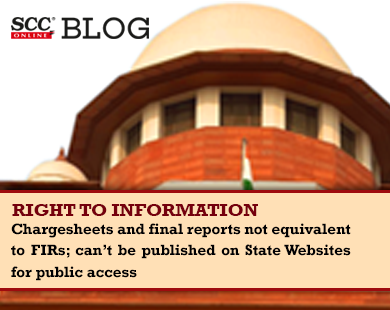Supreme Court: In a plea seeking free public access to chargesheets and final reports filed as per Section 173 of the Code of Criminal Procedure, 1973, the bench of MR Shah* and CT Ravikumar, JJ has held that the States cannot be directed to put such information on their websites.
Why was the direction sought?
The prayer was being made relying on ruling in Youth Bar Association of India v. Union of India, (2016) 9 SCC 473, wherein the Supreme Court had directed copies of FIRs to be published within 24 hours of their registration on the police websites or on the websites of the State Governments.
Advocate Prashant Bhushan, appearing for the petitioner, had argued that while the direction to the police to publish copies of FIRs on their websites has indeed induced transparency in the working of the criminal justice system, the logic of disclosure applies more strongly to chargesheets, for while FIRs are based on unsubstantiated allegations, chargesheets are filed after due investigation.
What did the Supreme Court hold?
Reliance on Youth Bar Association of India ‘thoroughly misconceived and misplaced'
The Court explained that in Youth Bar Association of India, the Court directed that the copies of the FIRs should be published within 24 hours of their registrations on the police websites or on the websites of the State Government. This was done looking to the interest of the accused and so that the innocent accused are not harassed, and they are able to get the relief from the competent court and they are not taken by surprise. Therefore, the directions in Youth Bar Association of India are in favour of the accused, which cannot be stretch to the public at large so far as the chargesheets are concerned.
Such direction would be contrary to the Scheme of CrPC
As per Section 173 Cr.P.C. and Section 207 Cr.P.C., the Investigating Agency is required to furnish the copies of the report along with the relevant documents to be relied upon by the prosecution to the accused and to none others. Therefore, if the relief as prayed in the present petition is allowed and all the chargesheets and relevant documents produced along with the chargesheets are put on the public domain or on the websites of the State Governments it will be contrary to the Scheme of the Criminal Procedure Code and it may as such violate the rights of the accused as well as the victim and/or even the investigating agency. Putting the FIR on the website cannot be equated with putting the chargesheets along with the relevant documents on the public domain and on the websites of the State Governments.
Sections 74 & 76 of the Evidence Act
Documents mentioned in Section 74 of the Evidence Act only can be said to be public documents, the certified copies of which are to be given by the concerned police officer having the custody of such a public document. Copy of the chargesheet along with the necessary documents cannot be said to be public documents within the definition of Public Documents as per Section 74 of the Evidence Act. As per Section 75 of the Evidence Act all other documents other than the documents mentioned in Section 74 of the Evidence Act are all private documents. Therefore, the chargesheet/documents along with the chargesheet cannot be said to be public documents under Section 74 of the Evidence Act, reliance placed upon Sections 74 & 76 of the Evidence Act is absolutely misplaced.
Section 4 of the Right to Information Act, 2005
Under Section 4(2) of the RTI Act a duty is cast upon the public authority to take steps in accordance with the requirements of clause (b) of sub-Section 1 of Section 4 of the RTI Act to provide as much information suo moto to the public at regular intervals through various means of communications. Copies of the chargesheet and the relevant documents along with the charge-sheet do not fall within Section 4(1)(b) of the RTI Act.
Conclusion
Hence, upon finding the reliance placed on all the provisions and the ruling in Youth Bar Association of India, to be absolutely misconceived and misplaced, the Court held that the petitioner was not entitled to the relief as prayed in the present petition namely directing all the States to put on their websites the copies of all the chargesheets/challans filed under Section 173 of the Cr.P.C.
[Saurav Das v. Union of India, 2023 SCC OnLine SC 58, decided on 20.01.2023]
*Judgment authored by: Justice MR Shah
Advocates who appeared in this case :
Counsel for the petitioner: Advocate Prashant Bhushan






